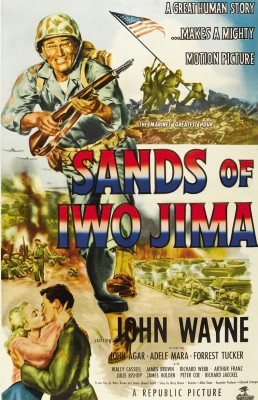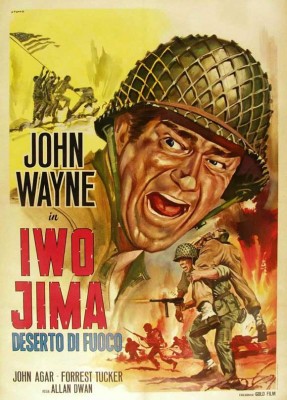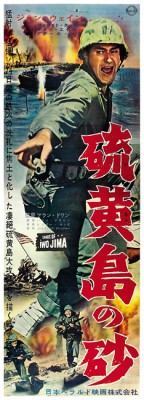| Reviews & Columns |
|
Reviews DVD TV on DVD Blu-ray 4K UHD International DVDs In Theaters Reviews by Studio Video Games Features Collector Series DVDs Easter Egg Database Interviews DVD Talk Radio Feature Articles Columns Anime Talk DVD Savant Horror DVDs The M.O.D. Squad Art House HD Talk Silent DVD
|
DVD Talk Forum |
|
|
| Resources |
|
DVD Price Search Customer Service #'s RCE Info Links |
|
Columns
|
|
|
Sands of Iwo Jima
In truth, Sands of Iwo Jima is an impressively sober, even grim, personal reflection on the war, and about as realistic as strict Production Code limitations of the time would allow. Steven Spielberg's revisionist Saving Private Ryan (1998) was hailed for capturing the horrors of the battlefield with a graphic realism never before depicted in a Hollywood movie. But most of what's impressive about that film in fact was present in Sands of Iwo Jima half a century before and, ironically, there are probably more genre clichés and certainly more sentimentality in Spielberg's movie than this supposed relic.
As with Olive's other Republic titles, Sands of Iwo Jima looks practically perfect on Blu-ray, creating an ideal opportunity for interested parties to reexamine the film, and for others to experience it for the first time.
Contrasting ad campaigns. I like the middle one best.
The busy but relatively simple plot casts John Wayne as career Marine Sergeant John Stryker, the humorless, relentlessly demanding leader of a squad of Marines who mostly despise him. Two men particularly dislike him: Pvt. Peter Conway (John Agar), the college-educated son of a recently deceased career Colonel that Stryker greatly admired, but for whom Conway feels nothing but resentment; and Pvt. Al Thomas (Forrest Tucker), a breezy but moderately underhanded character quick to bend regulations to serve his own interests. There are various other minor characters, such as constantly fighting brothers Frank and Eddie Flynn (Richard Jaeckel and William Murphy), Stryker's loyal Corporal, Robert Dunne (Arthur Franz, also the movie's narrator), a garrulous Greek (Peter Coe), a freckle-faced 18-year-old (Martin Milner), etc.
The story revolves around two battles, the invasion of Tarawa and the battle for Iwo Jima, and it's here where Sands of Iwo Jima's themes emerge. Though the makeup of Stryker's squad, as well as Stryker himself, are familiar characters seen in myriad other war movies, the focus is entirely if subtly different. In past war movies there was often a conflict between the no-nonsense sergeant and a man or two in the squad stubbornly refusing to be a "team player," whose selfishness threatened the squad's ability to combat the enemy as a unified, efficiently-run unit. In Sands of Iwo Jima, Stryker, a combat veteran who'd already experienced "the Canal" (Guadalcanal), drills his men relentlessly and appears unduly harsh and unforgiving on those who don't measure up to his impossible standards.
But Stryker's methods serve a single purpose: to prepare them for the unimaginable horrors of battlefield combat. He alone knows just how bad it's going to get. He alone knows that many of them won't be coming back. That's a heavy cross to bear.
In the first battle, on Tarawa, Stryker's men are scared out of their wits, pinned down on the beach "like fish in a barrel." Stryker barely can hold his understandably panicky squad together. But his intense drilling, which they had resented, nonetheless prepares them for what they encounter, and most survive that first assault. Of course, the battlefield conditions on Iwo Jima prove even direr, resulting in far more casualties, but also by this time the squad realizes just what this hard-as-nail autocrat has given them, namely, a chance for survival.
The movie doesn't demonize the barely-seen Japanese, the rhetoric is dialed way back compared to Hollywood movies made during the war, nor are there the kind of tiresome speeches about freedom and democracy from that period, and which began popping up again in Hollywood films of the 1950s. Indeed, for a movie made during the Cold War (and co-written by Big Jim McLain's James Edward Grant, no less), Sands of Iwo Jima is unexpectedly cynical. The very title of the film seems derived from a comment by one of Stryker's men about how the soil on Iwo Jima is the worst he's ever seen, prompting a comment that war is ultimately about trading men's lives for real estate.
The movie is impressively adult in other respects. Wayne's character is bitter about a divorce and custody battle over their son, sending Stryker on drinking binges whenever his squad is on furlough. In Hawaii, he meets a prostitute (Julie Bishop) using the same first name as his ex-wife. He's prepared to bed her down when he discovers that she's the single mother of a baby, turning tricks only so they won't starve. "There are a lot of tougher ways of making a living than going to war," she tells him. It's an amazingly frank and un-sentimentalized sequence, more so than the better-regarded From Here to Eternity (1953), which had to obscure Donna Reed's similar character.
Though hardly as graphic as the bloody Invasion of Normandy found in Saving Private Ryan, in its own way Sands of Iwo Jima is no less intense, and the picture looks far more expensive than it was, mainly because of the cooperation it received from the U.S. Marines.
Probably for that reason, in some ways the movie plays like a tribute to that branch of the Armed Forces, with the Marines' Hymn incorporated into the score far too much. Watching the film, I kept thinking how interesting it would be to see the film rescored with music less at odds with so much of what's onscreen. I imagine it would be an entirely different viewing experience.
Video & Audio
Presented in its original black-and-white, 1.37:1 aspect ratio, Sands of Iwo Jima looks fantastic most of the time, with only little bits of softness here and there, such as the opening titles. Otherwise, it's up to the same high standards of Olive's other Republic releases. The DTS-HD Master Audio mono (English only) is excellent. I had the volume turned up quite high as I watched it, yet even during the battle scenes there was a lot of oomph to explosions and the like with no distortion. No subtitle or alternate audio options, and no Extra Features.
Parting Thoughts
A vastly underrated film quite different from its reputation, Sands of Iwo Jima comes Highly Recommended.
Stuart Galbraith IV is the Kyoto-based film historian and publisher-editor of World Cinema Paradise. His credits include film history books, DVD and Blu-ray audio commentaries and special features.
|
| Popular Reviews |
| Sponsored Links |
|
|
| Sponsored Links |
|
|
| Release List | Reviews | Shop | Newsletter | Forum | DVD Giveaways | Blu-Ray | Advertise |
|
Copyright 2024 DVDTalk.com All Rights Reserved. Legal Info, Privacy Policy, Terms of Use,
Manage Preferences,
Your Privacy Choices | |||||||
















